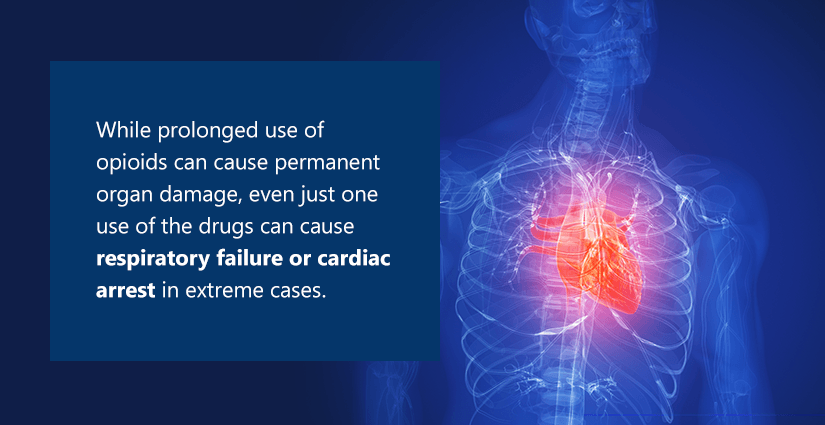COVID-19 Update
Health Care Resource Centers continues to serve patients in accordance with CDC, Federal and State Guidelines, putting the health and…
Where change begins.
While many people associate the term “opioids” with illegal drugs like heroin, it also applies to prescription pain medications. American patients receive more than 191 million opioid prescriptions each year. These medications interact with the body’s nerve cells, also known as neurons, to block pain and put patients at ease. Although opioids can help with managing pain for a short period, misusing them can negatively impact the body and brain in various ways.
To make the relationship between opioids and the brain and opioids and the body clearer, this article will go over what opioids do to the brain, what opioids do to your body and how to recognize an opioid problem. Keep reading to learn more about how taking opioids could impact your health overall.

The human brain has opiate receptors that serve as action sites for different kinds of opiates like morphine and heroin. Usually, these receptor sites interact with the body’s internal neurotransmitters, which are chemical messengers that bind to receptors to produce the appropriate bodily response. For example, dopamine molecules attach to dopamine receptors to create feelings of pleasure and reward.
Opioids and opiates mimic the effects of the body’s natural pain-relieving chemicals by binding to specific receptors to block the brain’s perception of pain. Along with reducing feelings of pain, opioids can stimulate sensations of well-being and even euphoria. These pain-relieving qualities make opioids an effective prescription drug for managing issues like post-surgery pain.
However, the body gradually builds up a tolerance toward opioids and opiates, requiring higher and higher quantities to achieve the same feelings of calm and happiness. As the drugs’ euphoric effects are increasingly tolerated by the body, an individual may start taking more intense quantities than prescribed or combining them with other substances to continue stimulating feelings of pleasure and reward.
Because the brain’s rewards systems are so powerful, prescription opiates can be dangerously addictive. Without a higher amount of the drug, withdrawal symptoms — such as muscle aches, irritability, anxiety, nausea or vomiting — may occur. To avoid these symptoms, a patient might start taking increasingly higher amounts of an opioid or opiate. This vicious cycle can develop into a reliance on the drug to function normally.

As the brain and body adjust their functioning to accommodate the intake of opiates or opioids, they start losing the ability to operate properly when the drugs are not present. While prolonged use of opioids can cause permanent organ damage, even just one use of the drugs can cause respiratory failure or cardiac arrest in extreme cases.
In general, the short-term effects of opioids on the body are as follows:
If regular opioid usage persists, more serious health concerns could arise. Here’s how long-term opioid use can affect various parts of the body:
When taken correctly, opioids can successfully mitigate pain as an effective method for managing injury or surgery pain. Using opioids as prescribed by a medical professional can help a patient recover as quickly and painlessly as possible.
However, anyone prescribed opioid painkillers should follow their doctor’s instructions very carefully, as opioids are highly addictive. Misusing opioids may lead to opioid use disorder, a medical condition characterized by the inability to abstain from using opioids. The probability of developing a long-term reliance on opioids rises sharply after just five days of prescription use.
Opioid use disorder typically includes many of the long-term side effects listed above as well as withdrawal symptoms, such as sweating and cravings. Opioid use disorder also involves behaviors focused on using opioids and obtaining the pleasant feeling the drugs cause, which often disrupt daily routines and inhibit healthy relationships.
Those who are prescribed opioid painkillers after a medical procedure can avoid opioid use disorder by speaking with their doctor about safe opioid use and following these tips:
Recognizing opioid misuse can be difficult, especially if the drug being misused is a pain medication prescribed for illness or injury. Additionally, opioids can affect your judgment and thinking processes, making it even more challenging to acknowledge an opioid use problem.
However, being aware of the most common signs of opioid misuse can help you address a reliance on the drug before it grows into an addiction. Stopping opioid misuse early can also save you from suffering the negative health effects of long-term use.
To avert an opioid addiction, watch out for these warning signs:
Along with these physical symptoms, the following behavioral changes may indicate a developing opioid addiction:
If you notice opioids are becoming the center of your life or you’re experiencing any of the signs listed above, consult a physician to discuss safely tapering off your medication or seeking further opioid misuse disorder treatment. Opioid misuse disorder can be managed with medications like methadone or buprenorphine paired with counseling support programs.
If you or a loved one is experiencing opioid reliance or opioid misuse disorder, contact Health Care Resource Centers (HCRC) to find out more about the recovery plans available.
At HCRC, we offer medication-assisted treatment (MAT) along with behavioral therapy to address opioid addiction from multiple angles. While MAT helps eliminate physical cravings, counseling addresses the underlying causes of addiction. This comprehensive approach to addiction recovery results in a better quality of life.
Find the HCRC clinic nearest you to take the first step toward overcoming opioid addiction today.